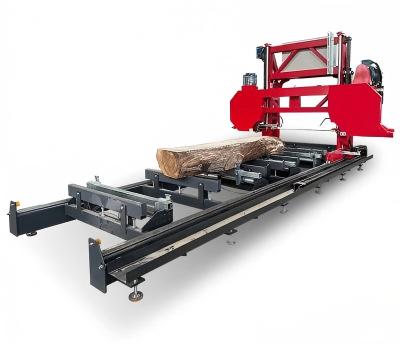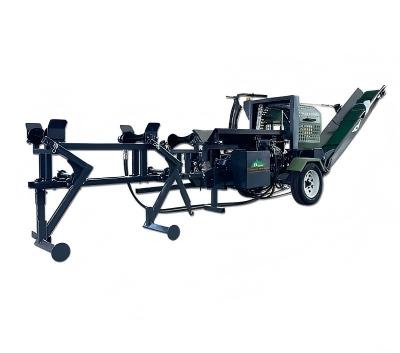The Power of Precision: Exploring the Modern World of Sawmills and Wood Processing Machinery
LEON MACHINERY
10/17/20257 min read


The Evolution of the Sawmill Industry
The sawmill industry has transformed remarkably over the last few decades. What once relied on hand-operated manual saws and inefficient cutting techniques has now evolved into a sophisticated network of high-performance sawmill machines. Today’s sawmills can handle large-scale timber operations, turning raw logs into perfectly cut boards, beams, or firewood with incredible accuracy.
The driving force behind this evolution is not just technology but the demand for faster production, reduced labor costs, and precision cutting. From portable sawmills that serve individual loggers to commercial sawmills that power industrial-scale lumber operations, the possibilities are vast and powerful.
Portable Sawmills: Freedom and Flexibility in Wood Processing
For many woodworkers and small business owners, the portable sawmill is the most practical innovation in the timber industry. It allows operators to process logs directly at the harvesting site, cutting down on transportation costs and maximizing resource utilization.
Portable sawmills are lightweight, easy to set up, and capable of handling various log sizes. This makes them perfect for rural forestry operations, woodworking artisans, and mobile timber businesses. Their compact design doesn’t compromise efficiency—modern units deliver clean, straight cuts that rival stationary sawmills.
Commercial Sawmills: Industrial Power and Unmatched Productivity
When the scale of production increases, a commercial sawmill becomes the heart of a lumber operation. These heavy-duty systems are designed for continuous, large-volume cutting. Their cutting speed, automated feed mechanisms, and integrated conveyors make them ideal for sawmill operators who need to process hundreds or thousands of logs per day.
Unlike smaller models, commercial sawmills can be part of an integrated sawmill line, connecting multiple machines such as log decks, debarkers, and edgers. The result? A seamless production flow with minimal downtime and maximum profitability.
Circular Sawmills: Precision Cutting at Its Best
The circular sawmill remains a trusted workhorse in the timber industry. Known for its robust structure and powerful circular blades, it is ideal for producing consistent cuts in heavy and dense timber. Circular sawmills excel in handling large-diameter logs and are valued for their speed and accuracy.
Modern designs incorporate improved blade technology, reduced vibration, and enhanced safety features, making them not only powerful but also user-friendly. Whether used in commercial operations or integrated into sawmill lines, circular sawmills are built for precision and endurance.
Vertical Bandsaw Mills: Smooth, Efficient, and Economical
Vertical bandsaw mills are another crucial part of modern wood processing. Unlike circular saws, they use a thin, continuous blade that reduces kerf waste and increases lumber yield. This makes them particularly useful when efficiency and material savings are priorities.
They offer exceptional straightness and smoothness in cuts, producing high-quality lumber with minimal surface defects. Their vertical design also provides easier log handling, which is especially valuable for operators working with varied log sizes.
Complete Sawmill Lines: The Ultimate Production Solution
For businesses aiming for maximum efficiency, a sawmill line is the pinnacle of production engineering. A sawmill line integrates multiple machines into a continuous workflow—starting from log loading, cutting, edging, and sorting, all the way to stacking the final boards.
These fully automated lines reduce manual handling, increase throughput, and ensure consistent product quality. Whether used for pine, hardwood, or mixed species, sawmill lines bring industrial-grade capacity to any timber operation.
Wood Board Edger Machines: Maximizing Lumber Value
Once logs are sawn into boards, the next critical step is edging. A wood board edger machine removes irregular edges, squaring up the boards and optimizing their value. This machine plays a vital role in increasing lumber yield and improving board uniformity.
Modern edgers feature adjustable blades, laser guides, and automatic feed systems that make edging faster and more precise. In integrated sawmill lines, they function as essential components, enhancing overall operational flow.
Firewood Processors: Turning Timber into Energy
In many regions, firewood remains a primary source of energy. Firewood processors streamline the labor-intensive process of cutting and splitting logs into ready-to-burn firewood. They are a staple for firewood businesses, forestry services, and homesteads seeking efficiency.
These machines combine saws, splitters, and conveyors into one unit, allowing operators to process logs quickly and with minimal physical effort. Whether powered by gasoline, diesel, or electricity, firewood processors are essential for anyone serious about wood fuel production.
Manual Firewood Processors: The Traditional Workhorse
A manual firewood processor is ideal for small-scale users who want the benefits of a processor without complex automation. It offers greater control and is often more affordable than automated models. Although it requires more operator input, it remains reliable and efficient for modest workloads.
Diesel Firewood Processors: Heavy-Duty and Mobile
For industrial-scale production, diesel firewood processors deliver raw power. Their robust engines make them suitable for remote operations where electrical infrastructure might not be available. Diesel power ensures continuous performance even under demanding workloads, making these units a top choice for commercial firewood suppliers.
Electric Firewood Processors: Quiet, Clean, and Efficient
When noise reduction and energy efficiency are priorities, electric firewood processors stand out. These machines operate with less noise, lower emissions, and reduced operational costs compared to fuel-powered alternatives. They’re perfect for environmentally conscious operations and indoor processing facilities.
Gasoline Firewood Processors: Balanced Power and Mobility
A gasoline firewood processor strikes a balance between portability and power. These units are widely used in forestry and mobile operations because of their ease of transport and dependable performance. They offer a versatile option for both small-scale producers and larger businesses.
Firewood Processor Lines: Full-Scale Firewood Production
For companies looking to produce firewood on a large scale, firewood processor lines offer complete automation—from log input to bagging or bundling. Integrating conveyors, splitters, saws, and packaging systems, these lines significantly boost production speed while maintaining quality standards.
Timber Trailers with Cranes: Mobility Meets Strength
Transporting logs efficiently is a critical part of wood processing. A timber trailer with crane simplifies this task by allowing operators to load and transport heavy logs directly from the forest to the processing site. These trailers are equipped with hydraulic cranes that can lift and position logs with precision, reducing manual labor and increasing safety.
Log Splitters: A Timeless Tool in Wood Preparation
The log splitter is one of the most recognizable tools in the firewood processing world. It’s designed to split logs into smaller, more manageable pieces, making them suitable for firewood, construction, or further processing. From household use to industrial-scale splitting, there’s a model for every application.
Electric Log Splitters: Clean Power for Small-Scale Operations
An electric log splitter offers quiet operation and zero emissions. It’s perfect for homeowners, small businesses, and workshops where electricity is readily available. Its simplicity and ease of use make it an increasingly popular option.
Gas/Diesel Log Splitters: Unstoppable Power
When larger logs or high volumes are involved, gas or diesel log splitters come into play. These rugged machines deliver unmatched splitting force, enabling operators to process tough hardwoods with ease. They’re ideal for forestry operations, sawmills, and commercial firewood producers.
PTO Log Splitters: Tractor-Powered Efficiency
A PTO log splitter connects directly to a tractor’s power take-off system. This setup is particularly popular in agricultural environments where tractors are already in use. By harnessing existing power sources, PTO splitters provide an economical and practical splitting solution.
Band Saw Blade Sharpeners: Extending Blade Life and Precision
Keeping saw blades sharp is essential for clean, accurate cuts. A band saw blade sharpener ensures your blades are maintained to peak condition. By regularly sharpening blades, operators reduce waste, improve lumber quality, and extend blade life.
Automatic Saw Blade Sharpeners: Precision Meets Automation
For large operations, an automatic saw blade sharpener eliminates the need for manual sharpening. These advanced machines can handle multiple blades with minimal supervision, ensuring consistent sharpening angles and perfect cutting edges every time.
Electric Saw Blade Sharpeners: Reliable and Compact
An electric saw blade sharpener is a perfect balance between convenience and performance. Compact yet powerful, it’s suitable for workshops, sawmills, and portable operations. Electric sharpeners allow operators to maintain blades on-site, minimizing downtime and maximizing productivity.
Why Investing in Quality Wood Processing Equipment Matters
In the world of lumber and firewood, efficiency, precision, and durability define success. Investing in advanced sawmills, firewood processors, log splitters, and blade sharpeners pays dividends over time. These machines not only increase production capacity but also reduce waste, lower labor costs, and improve product quality.
Whether you're running a portable sawmill in a rural forest, managing a commercial sawmill with an integrated production line, or operating a firewood processor line for heating supply businesses, quality equipment is the foundation of sustainable success.
The Role of Automation in Modern Sawmills
Automation has redefined how sawmills operate. From automatic saw blade sharpeners to firewood processor lines, automation reduces manual effort, enhances precision, and ensures consistent results. Businesses adopting automated systems can scale up quickly while maintaining high-quality standards.
Safety and Maintenance: Protecting Operators and Equipment
Every sawmill or firewood operation must prioritize safety. Regular maintenance of blades, conveyors, engines, and hydraulic systems keeps the equipment in top condition while preventing accidents. Safety shields, emergency stops, and operator training are critical for ensuring safe and efficient operation.
Environmental Considerations in Wood Processing
Sustainable forestry and wood processing practices are more important than ever. Modern equipment is designed to reduce waste, improve energy efficiency, and minimize environmental impact. Electric firewood processors and electric log splitters, for example, offer clean alternatives to traditional fuel-powered models.
Choosing the Right Equipment for Your Operation
Selecting the ideal sawmill or firewood processor depends on your operational scale, power availability, and production goals.
For small-scale use: Portable sawmills, manual firewood processors, and electric log splitters provide excellent value.
For industrial operations: Commercial sawmills, diesel firewood processors, and sawmill lines deliver unmatched performance.
For precision: Automatic saw blade sharpeners ensure consistent results.
Future Trends in the Wood Processing Industry
As global demand for lumber and renewable energy grows, wood processing technology continues to evolve. We’re seeing more smart automation, IoT-enabled machinery, and eco-friendly power solutions entering the market. These innovations promise to make sawmills faster, safer, and more efficient.
Partnering with Trusted Machinery Suppliers
For wood processing businesses, choosing a reliable machinery partner is just as important as choosing the right equipment. A trusted supplier provides technical support, spare parts, and expertise to keep your operations running smoothly.
With decades of experience in timber and firewood processing technology, Leon Machinery offers a full range of solutions—portable sawmills, commercial sawmills, sawmill lines, log splitters, firewood processors, and more.
📞 Contact Leon Machinery
For top-quality sawmill and wood processing equipment, partner with Leon Machinery today.
WhatsApp: +8618136773114
Email: leonxu0317@gmail.com
🪵 #Sawmill #PortableSawmill #CommercialSawmill #CircularSawmill #BandsawMill #SawmillLine #WoodBoardEdger #FirewoodProcessor #DieselFirewoodProcessor #ElectricFirewoodProcessor #GasolineFirewoodProcessor #LogSplitter #ElectricLogSplitter #DieselLogSplitter #PTOSplitter #SawBladeSharpener #AutomaticBladeSharpener #ElectricBladeSharpener #TimberTrailer #LumberIndustry #WoodProcessing #LeonMachinery


